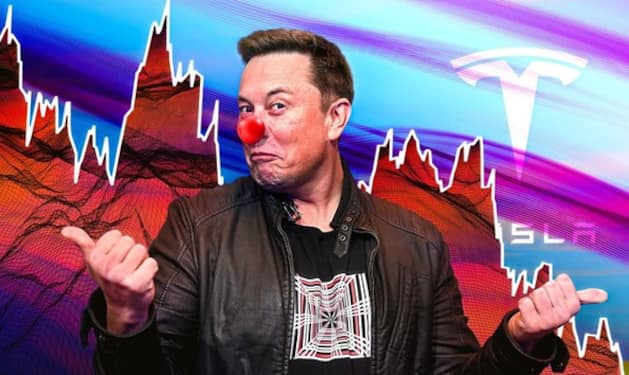If Elon Musk were a celestial body, he would probably be described as a comet burning up before the eyes of the world audience. The comet’s nucleus has already melted, and the tail of the share price, which can be seen from afar, illuminates the descent.
Within a year, the stock lost 66 percent of its value. Around 240 billion US dollars of market value were destroyed.
In parallel to the market value, Elon Musk’s personal reputation has also suffered. The entrepreneur, who was once celebrated like a prophet, is now seen in many places as a high-tech hallodri. Nobel laureate Professor Paul Krugman recently wrote on page 1 of the New York Times: “I wouldn’t trust that man with my house cat.”
There are essentially five reasons that are responsible for the descent:
The Tesla Model Y Long Range with all-wheel drive now has to be sold at a bargain price in China. The carmaker has just reduced the car by 6,656 euros. It is the second price reduction in a short time. Tesla already lowered prices in the Middle Kingdom in October.
Same game in Germany. In November, 30 percent of all new Tesla cars were registered with rental car companies. Car expert Prof. Ferdinand Dudenhöffer says: “The increasing rental approvals are a clear sign of incentives and discounts with which Tesla is intervening in the market.”
The price offensive is the result of a competition that no longer admires Tesla, but attacks it. While the market for “New Energy Vehicles” in China reached a new all-time high in December 2022, demand for Teslas collapsed. Data from the China Passenger Car Association (CPCA) show that Tesla sold 55,796 units in December, down 44 percent from November.
The Chinese supplier BYD is Tesla’s strongest competitor in terms of sales of purely electric cars. If you include the plug-in hybrids, BYD has even become the world market leader.
The German automotive industry has also woken up and is now offering technologically sophisticated electric cars that – like the Taycan from Porsche or the EQS from Mercedes – are superior to a Tesla vehicle. In the meantime, the entire German car budget for research and development flows into the former niche segment of e-mobility.
“At least in the US we want to roll out autonomous driving technology on a large scale and possibly also in Europe, depending on the approval of the authorities.”
Musk promised that in August last year.
The truth is: The Chinese competition has overtaken him in the field of autonomous driving. While Baidu offers robo-taxis without a driver on public roads in China, only semi-autonomous driving at Level 2 is possible with a Tesla. Level 2 means that it must be ensured that the driver always keeps his hands on the steering wheel.
Even the German manufacturers are now further along. In its S-Class, Mercedes offers an Autodrive pilot that enables automated driving at Level 3, which can also be used on local motorways. Humans give up control for the first time. The driver only has to be potentially able to intervene.
BYD now has more battery know-how. The Chinese answer to the Model 3 is the BYD Seal. He should score with a range of over 700 kilometers. For comparison: According to the current ADAC test, with a moderate driving style, the Model 3 can be driven for just 415 kilometers without charging with the standard range version.
Musk’s Twitter deal revealed a playful trait in the 51-year-old that, given Tesla’s entrepreneurial challenge, no longer seems cool but “stupid.” “Musk is denied social skills,” says car expert Dudenhöffer. As a result, it is no longer considered irreplaceable. There is already speculation among investors about his successor.
Gabor Steingart is one of the best-known journalists in the country. He publishes the newsletter The Pioneer Briefing. The podcast of the same name is Germany’s leading daily podcast for politics and business. Since May 2020, Steingart has been working with his editorial staff on the ship “The Pioneer One”. Before founding Media Pioneer, Steingart was, among other things, Chairman of the Management Board of the Handelsblatt Media Group. You can subscribe to his free newsletter here.
Musk is clearly withdrawing from the company and, according to Reuters, is bringing his previous head of business in China, Tom Zhu, at least as a possible deputy. Bloomberg reported yesterday that an Icelandic investor is requesting a key person risk report. Important to know: Musk is no longer the master of the house. Last year he sold Tesla shares worth a good 40 billion US dollars and therefore only holds 14.84 percent of the company.
Conclusion: The farewell to Elon Musk has begun. The aura of invulnerability is gone. The competition was only hypnotized for a historical moment of shock – and then agreed on the favorite motto of all rascals: “Don’t hate, imitate.”
Ultra-rich – Elon Musk: Does what he wants because he can















